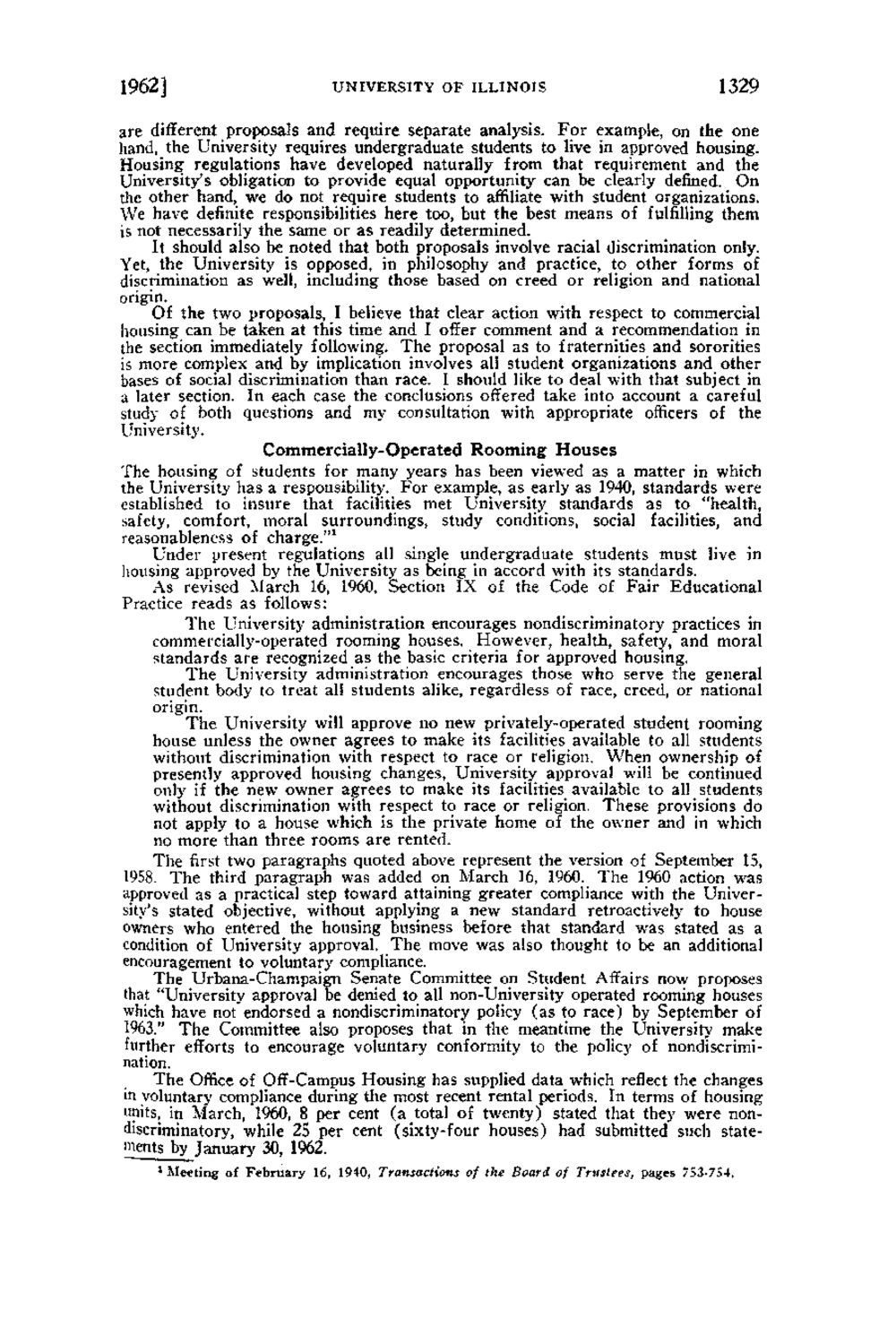| |
| |
Caption: Board of Trustees Minutes - 1962
This is a reduced-resolution page image for fast online browsing.

EXTRACTED TEXT FROM PAGE:
1962] U N I V E R S I T Y OF I L L I N O I S 1329 are different proposals and require separate analysis. F o r example, on the one hand, the University requires undergraduate students to live in approved housing. Housing regulations have developed naturally from that requirement and the University's obligation to provide equal opportunity can be clearly defined. On the other hand, we do not require students to affiliate with student organizations. We have definite responsibilities here too, but the best means of fulfilling them is not necessarily the same or as readily determined. It should also be noted that both proposals involve racial discrimination only. Yet, the University is opposed, in philosophy and practice, to other forms of discrimination as well, including those based on creed or religion and national origin. Of the two proposals, I believe that clear action with respect to commercial housing can be taken at this time and I offer comment and a recommendation in the section immediately following. T h e proposal as to fraternities and sororities is more complex and by implication involves all student organizations and other bases of social discrimination than race. I should like to deal with that subject in a later section. In each case the conclusions offered take into account a careful study of both questions and my consultation with appropriate officers of the University. Commercially-Operated R o o m i n g H o u s e s The housing of students for many years has been viewed as a matter in which the University has a responsibility. For example, as early as 1940, standards were established to insure that facilities met University standards as to "health, safety, comfort, moral surroundings, study conditions, social facilities, and reasonableness of charge." 1 Under present regulations all single undergraduate students must live in housing approved by the University as being in accord with its standards. As revised March 16, 1960, Section IX of the Code of Fair Educational Practice reads as follows: The University administration encourages nondiscriminatory practices in commercially-operated rooming houses. However, health, safety, and moral standards are recognized as the basic criteria for approved housing. The University administration encourages those who serve the general student body to treat all students alike, regardless of race, creed, or national origin. The University will approve no new privately-operated student rooming house unless the owner agrees to make its facilities available to all students without discrimination with respect to race or religion. When ownership of presently approved housing changes, University approval will be continued only if the new owner agrees to make its facilities available to all students without discrimination with respect to race or religion. These provisions do not apply to a house which is the private home of the owner and in which no more than three rooms are rented. The first two paragraphs quoted above represent the version of September IS, 1958. The third paragraph was added on March 16, 1960. The 1960 action was approved as a practical step toward attaining greater compliance with the University's stated objective, without applying a new standard retroactively to house owners who entered the housing business before that standard was stated as a condition of University approval. The move was also thought to be an additional encouragement to voluntary compliance. The Urbana-Champaign Senate Committee on Student Affairs now proposes that "University approval be denied to all non-University operated rooming houses which have not endorsed a nondiscriminatory policy (as to race) by September of 1963." The Committee also proposes that in the meantime the University make further efforts to encourage voluntary conformity to the policy of nondiscrimination. The Office of Off-Campus Housing has supplied data which reflect the changes in voluntary compliance during the most recent rental periods. In terms of housing units, in March, 1960, 8 per cent (a total of twenty) stated that they were nondiscriminatory, while 2S per cent (sixty-four houses) had submitted such statew»its_byjanuary 30, 1962. 1 Meeting of February 16, 1940, Transactions of the Board of Trustees, pages 753-754.
| |